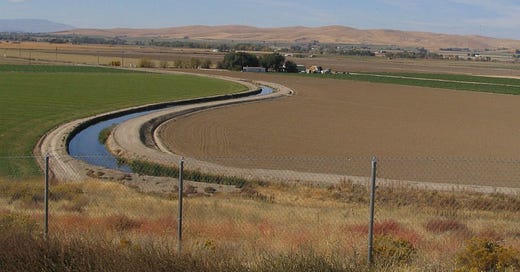The Way: Broadband Access, Legal Aid, #GovernorGoals, and more
Share the latest version of the Way and help all Oregonians learn about a unique chance to shape the 2022 election.
Did you miss “The Liftoff”?
Read the latest version here
You shouldn’t have to be an “Insider” to be in the know.
Editor’s Note:
For nearly twenty five years, I lived in the one hundred mile stretch between Portland and Eugene. During four of those years, my time at the University of Oregon, people regularly asked me where I was from—it’s one of the most common small talk questions for college students, after “What’s your major?” In response, I’d err on the side of assuming they were from California and say, “Just outside of Portland,” rather than specifying my hometown, Beaverton. If it turned out to be a Portlander asking the question, they’d probe, “What does that mean? Are you from Portland or some suburb?”
Now, nearly five years into grad school, when people in Cambridge, Massachusetts ask the same origin question, I always say, “Portland.” No hedging. This still leads to a follow-up question. “Oh, like Maine?”
Not a lot of New Englanders have ever really gotten to know an Oregonian. Turns out most of the country hasn’t gotten to know many Oregonians. College grads from our state, statistically the most mobile part of the population, are home bodies. More than one in three Oregon State grads end up in Portland. When you factor in the Beavers that stay on this side of the Rockies, about half of OSU grads never cross the Continental Divide (excluding things like vacations, of course). Ducks are barely more adventurous. Three in ten go to Portland. Another two in ten go to Seattle or one of California’s larger cities. Smaller schools, like Lewis & Clark, have even smaller geographic footprints. More than four in ten grads from L&C stay put in the Portland area. Nearly seven in ten Portland State students similarly get their roots in the Rose City.
In many respects, keeping college grads at home or nearby is extremely beneficial. In the long-run, “economic growth is really about how many workers there are and how productive each worker is,” according to the Oregon Office of Economic Analysis. Even better if those workers have some higher education. Better yet, they have a STEM+ degree. But merely holding onto your own is not enough. If sustained population growth is so important to robust economic growth, then Oregon must do more than merely hold onto its own. We must also attract the best and brightest to our greener pastures.
Right now, Oregon has mixed success in that regard and the national perception of Portland suggests that our rate of attracting new Oregonians may soon decrease. Looking across the region, more STEM+ degree holders head to our neighbors— California, Washington, Colorado, Hawaii. Looking ahead, there’s a chance that the negative impact the Office of Economic Analysis has already detected from local protests and clashes of violence have had on Portland’s economic recovery will continue to nudge people to different locations or, at a minimum, to just stay in their homes.
Back at school this year, once I’ve specified that I’m from Portland, Oregon, people usually ask me about the social unrest and/or “Portlandia,” the TV show. Increasingly, they just ask about the former. Their perception of Portland and, though unfair to the rest of the state, Oregon as a whole is usually the product of a Wall Street Journal op-ed or New York Times think piece questioning why Portland seems unable to govern itself.
These days, perception and reality have achieved the same status as the conflict definitions of literally—they are seemingly inseparable. So, if we want to correct the reality that fewer people are seeing Portland as a welcoming destination for their family and/or business, then we have to address Portland’s perception problem.
Oregon’s best and brightest don’t have to permanently relocate to share the good parts (as well as the parts we’re working on) of Portland and the state as a whole. Even temporary stints in new destinations that result in you making new friendships and connections can be the difference in whether people even consider the Beaver State as a potential destination.
I’ve always said that the best part of Oregon is its people. It’s too bad so few Americans get to know us.
Here’s to a better Oregon,
Kevin
To look forward to:
Rob Harris discusses an important new initiative underway in Oregon.
Nathan Howard outlines his work on implementing Measure 109.
Mark Hester looks at the political and economic factors creating the supply-chain crisis.
To read:
What are #GovernorGoals? Learn more about the special series we’ll be doing in 2022.
read more here.
Why do we need to close the Justice Gap? A small investment in legal services can lead to a lot of social good.
read more here.
What would a government focused on the Marginal Value of Public Funds look like? The short answer is spend a lot more on young Oregonians.
read more here.
Every Oregonian should have access to high-speed Internet by 2030. That lofty goal might actually be possible.
read more here.
To do:
Share The Oregon Way with three friends
Nominate a contributor to TOW
Tell us how we can improve!
"Scenic Vista between Vale and Ontario, Oregon, U.S. Route 26" by Ken Lund is licensed under CC BY-SA 2.0




